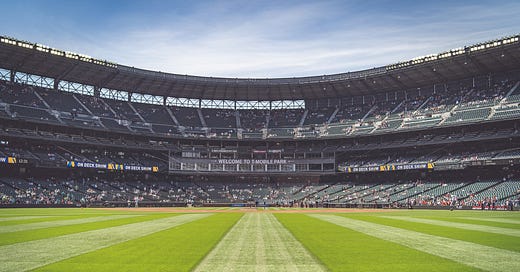Wealthy team owners and the money we throw at them
One of my first real reporting jobs was covering the business of sports for The Daily Record in Baltimore and I loved it. (Shoutout to my stellar editor, Ed Waldman.) To me, this beat had all the attraction that comes with sports journalism (going to training camps, watching games from the press box while eating free popcorn, doing a wide-ranging interview with Orioles owner Peter Angelos) and none of the 1 a.m. deadlines. I’ve long since moved on from that job, but have always jumped at the opportunity to write about sports and the money we spend on it.
In that spirit, this week’s newsletter covers some of the recent sports-related developments that affect government coffers.
Aren’t we over stadium bonds yet?
Congress is once again trying to do away with stadium bonds. Late last month, Reps. Earl Blumenauer (D-Ore.), Jackie Speier (D-Calif.) and Don Beyer (D-Va.) reintroduced a bill called the “No Tax Subsidies for Stadiums Act,” which would eliminate the tax-exempt status of municipal bonds issued for professional sports stadiums. It’s the second version of this particular bill, but the idea of eliminating the federal subsidy for these types of bonds has been batted around since the Obama administration.
“There is no justification for these multibillion-dollar franchises to be eligible for tax-exempt municipal bonds,” Speier told the Washington Post. “This is tax dollars that could be used for any number of really important public-interest programs.”
The Post devoted a lot of ink to the fact that Washington Commanders owner Dan Snyder wants to build a new NFL stadium. Presumably, he’d try to wrest some public concessions from Washington, D.C. to bring the team back inside city lines and this bill could nip any notion of public financing in the bud.
The bill follows one of the recommendations made in a March 2020 study that estimated (using 2018 dollars) the federal government had given up about $4.3 billion in potential income tax revenue from stadium bonds issued since 2000.
That sounds like a lot and as the national debt piles up, every little bit helps. But $4.3 billion is a tiny fraction of what the federal government collects every year, and practically a rounding error when you spread it out over 20 years.
What’s more, publicly financed stadiums have largely fallen out of favor. I analyzed the study’s list of 43 professional stadiums that have opened since 2000 and found, as I suspected, that most of them broke ground during the first decade of this century. Just 13 professional stadiums have broken ground since 2010 and fewer than half (six) included any type of public financing.
The data also show that the subsidized portion of sports arenas and stadiums went significantly down after 2010, from more than half of the total cost to less than 15%. (All data is in 2018 dollars.)
Bottom line, making stadium bonds taxable isn’t likely to make much of a fiscal difference. Stadium bonds have become unpopular for many of the reasons the study’s authors say they are useless: They don’t actually sway a team owner’s decision to relocate and they don’t have a proven positive economic impact that wouldn’t have happened otherwise. The latter point is also influenced by the fact that cities have often given up some local tax revenue as part of these stadium deals.
Given that many places are still paying off debt for stadiums built in the 1990s and early 2000s, one could argue that we’ll see another swing toward stadium bonds when they’re paid off. But that’s highly doubtful given that 1) taxpayer support for giving rich team owners a subsidy has waned, and 2) state and local municipal market activity is more likely to be focused on projects encouraged by the federal infrastructure bill (such as bridges and carbon-reduction projects). Governments just won’t have the bandwidth to issue more debt on projects that aren’t a proven public good.
Stadium bonds by the numbers
Keep reading with a 7-day free trial
Subscribe to Long Story Short to keep reading this post and get 7 days of free access to the full post archives.





